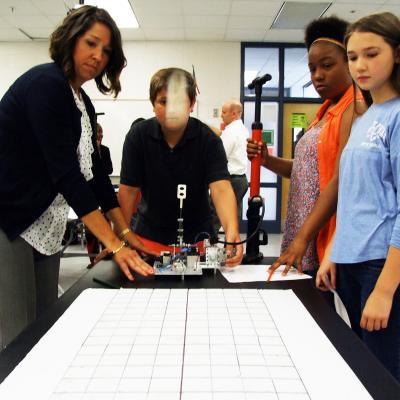Researchers Found Enrollment in Middle School Engineering Courses Improves Students’ Academic Achievement and Self-Efficacy
Oct 29, 2018
A six-year-long study conducted by a team of researchers at Georgia Tech’s Center for Education Integrating Science, Mathematics, and Computing (CEISMC) has been published in the International Journal of Education in Mathematics, Science, and Technology (IJEMST). The peer-reviewed article is titled “The Impact of a Middle School Engineering Course on Students’ Academic Achievement and Non-Cognitive Skills.”
The authors of the study are Meltem Alemdar, Roxanne A. Moore, Jeremey A. Lingle, Jeff Rosen, Jessica Gale, and Marion C. Usselman. The researchers examined the impact of a three-year engineering course sequence developed by the Advanced Manufacturing and Prototyping Integrated to Unlock Potential (AMP-IT-UP) program.
The AMP-IT-UP program is a five-year National Science Foundation (NSF) Math and Science Partnership grant awarded to CEISMC and the School of Mechanical Engineering. Its mission is to promote science, technology, engineering, and mathematics (STEM) workforce development and to identify and cultivate the next generation of creative STEM innovators.
The project designed new middle school STEM Innovation and Design (STEM-ID) engineering courses to increase both engagement with and interest in STEM among middle school students. The authors of the article note that middle school is a crucial period for students to engage with math and science because students begin to consider future professions more seriously during this time.
The STEM-ID courses, titled Carnival Tycoon, Flight of Fancy, and Robot Rescue, were developed for students in the sixth, seventh, and eighth grades, respectively. The courses require students to engage with the engineering design process, collect and analyze data, and effectively communicate their ideas.
“It is very important that students have a low-stress but highly engaging environment in which to practice their math and science skills,” said Dr. Marion Usselman, Principal Investigator on the AMP-IT-UP project. “The STEM-ID courses, taken alongside the core math and science courses, provide students with just such an experience.”
Based on their analysis of student performance data on the state-level standardized math and science tests, the researchers found that students who enrolled in AMP-IT-UP engineering courses at least twice during middle school performed significantly better on the math and science tests than did students who never took these courses. Students who had taken the courses also reported increased academic self-efficacy and a heightened interest in math and science.
Further, middle school students reported in interviews that the skills they acquired in engineering courses prepared them to succeed in math and science classes, and that concepts that may be confusing in math class became more accessible once applied in engineering.
“This is a huge contribution to the K-12 engineering education literature,” said Dr. Meltem Alemdar, co-Principal Investigator for research on the AMP-IT-UP project.
“This published article confirms our hypotheses that enabling students to practice their science and math skills within the context of engaging middle school engineering classes can significantly benefit both their engagement in STEM and their academic achievement.”
By: Rosemary Pitrone - CEISMC Communications



